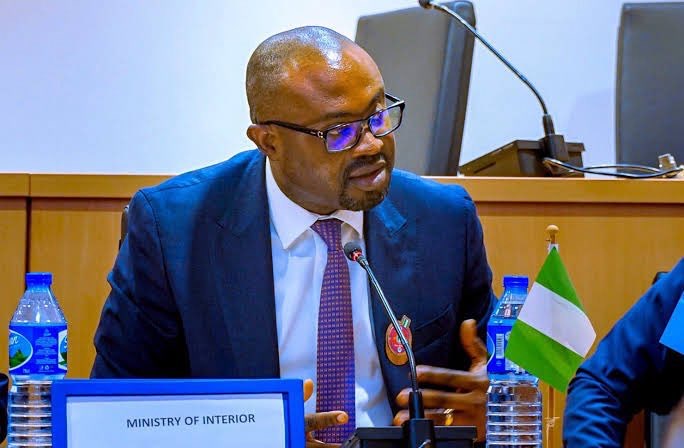When President Bola Ahmed Tinubu unveiled his Renewed Hope administration, Nigerians expected bold reforms and leaders who would deliver results that citizens could feel in their daily lives. Among the cabinet members, one name consistently stands out for redefining what public service should look like, Dr. Olubunmi Tunji-Ojo, Minister of Interior. His performance has been nothing short of transformative, earning him recognition as arguably the most impactful minister under this administration.

Winston Churchill once said, “However beautiful the strategy, you should occasionally look at the results.” If results are the measure, Dr. Tunji-Ojo has set the benchmark.
Revolutionising Passport Reforms: A New Era for Nigerians
One of Dr. Tunji-Ojo’s earliest victories was the dramatic clearance of over 204,332 backlogged passport applications in less than three weeks — a feat many thought impossible. For years, passport offices were synonymous with frustration. Nigerians endured months of waiting, endless queues, and exploitation by middlemen who thrived on bureaucratic delays. By attacking the backlog head-on, the minister restored faith in government and sent a strong message: the old ways of inefficiency would no longer be tolerated.
But he didn’t stop at clearing backlogs. He institutionalised a two-week processing timeline for new passports, introduced home and office delivery services, and allowed citizens to upload passport photographs online. These innovations drastically reduced human contact points, closed loopholes for corruption, and improved efficiency.
Perhaps the most transformative achievement is the commissioning of a Centralised Passport Personalisation and Production Centre in Abuja. For decades, Nigeria, a nation of over 200 million people, had to rely on foreign countries to produce its passports. This dependence was not just logistically cumbersome but a national embarrassment. By delivering a world-class facility at zero additional cost to the government, Tunji-Ojo has restored national pride and sovereignty over such a critical national asset.
Public policy expert Dr. Joe Abah summed it up best when he said:
“I think I’ll make time to go and see that new Centralised Passport Personalisation Centre. I understand that the Federal Government didn’t pay a kobo extra for it. I dey like that kind thing. Well done, my favourite Minister @BTOofficial.”
The new centre has consolidated passport production, boosted daily output to over 4,500 booklets, and ensured uniform quality across the federation. For the first time, Nigeria’s passport system operates on par with global standards, a leap forward in service delivery.
Immigration & Border Security Modernisation
National security begins at the borders, and under Dr. Tunji-Ojo, Nigeria has taken bold steps to secure them. He supervised the deployment of biometric e-gates at major international airports, including Lagos, Abuja, Port Harcourt, Kano, and Enugu. These e-gates have revolutionised passenger clearance, cutting waiting times and using biometric verification to enhance security.
Beyond infrastructure, he established a Migration Command & Control Centre and a modern Data Centre, providing real-time monitoring of border activities. This system integrates surveillance technology, intelligence gathering, and communication with border operatives, a critical upgrade in an era where transnational crime and terrorism remain threats.
His reforms have not only improved efficiency but have also sent a message to the world that Nigeria is serious about secure, tech-driven border management.
Strengthening Nigeria’s Identity Management System
Dr. Tunji-Ojo has also focused on building a reliable national identity system. By working closely with the National Identity Management Commission (NIMC), he has driven efforts to harmonise identity databases, improve NIN verification systems, and increase enrolment coverage. This work will have long-term benefits, from enhancing national security to simplifying access to financial and social services.
A strong digital identity ecosystem is the backbone of any modern state, and Tunji-Ojo’s initiatives are laying the foundation for a future where every Nigerian can be uniquely identified, improving planning and service delivery.
Decongesting Correctional Centres and Promoting Rehabilitation
Nigeria’s correctional centres have been notoriously overcrowded, with many inmates held for minor offences simply because they could not afford fines. Dr. Tunji-Ojo tackled this head-on by facilitating the payment of ₦585 million in fines and compensations for 4,068 inmates, giving them a second chance at life.
More importantly, he is championing a shift in philosophy, from punishment to rehabilitation. Skills acquisition and education programs within correctional facilities are being expanded, aimed at reintegrating inmates into society as productive citizens. This humane approach reduces recidivism and promotes public safety.
Empowering Paramilitary Agencies
Recognising that an effective Ministry of Interior depends on motivated personnel, Dr. Tunji-Ojo facilitated promotions across all paramilitary agencies — the Nigeria Immigration Service (NIS), Nigeria Security and Civil Defence Corps (NSCDC), Nigeria Correctional Service (NCoS), and Federal Fire Service (FFS). These promotions boosted morale, rewarded merit, and improved agency performance.
He is also championing the establishment of a dedicated pension board for paramilitary officers, ensuring that those who serve the nation are treated with dignity after retirement.
Birth of the Mining Marshals
In partnership with the Minister of Solid Minerals Development, Dr. Tunji-Ojo helped create the Mining Marshals, a specialised security outfit tasked with protecting Nigeria’s mining assets from illegal operators and securing revenue streams. This collaboration is a model of inter-ministerial synergy and demonstrates how security can directly support economic growth.
Transparency, Technology, and Public Trust
Dr. Tunji-Ojo’s emphasis on automation and digitisation has drastically reduced opportunities for corruption. The passport application process, once shrouded in opacity, is now transparent and trackable. Public-private partnerships have funded secure data centres, guaranteeing data integrity and continuity.
This culture of transparency is winning back public trust and proving that government can deliver efficient, citizen-focused services.
Leadership and Governance by Example
John C. Maxwell said, “A leader is one who knows the way, goes the way, and shows the way.” Dr. Olubunmi embodies this principle. He doesn’t just sign memos; he personally supervises projects, from passport centres to airport e-gates — ensuring standards are met.
Former UN Secretary-General Kofi Annan observed that “Good governance is perhaps the single most important factor in eradicating poverty and promoting development.” By driving institutional reforms and improving public service delivery, Dr. Tunji-Ojo is laying the groundwork for a stronger Nigeria.
Why He Stands Out as the Best Minister
In a cabinet full of capable individuals, Dr. Tunji-Ojo’s results speak the loudest. His work touches millions of lives — from the student who gets her passport in time to study abroad, to the small-scale miner whose livelihood is protected from illegal operators, to the correctional inmate who gets a second chance.
Theodore Roosevelt once said, “The best executive is the one who has sense enough to pick good men to do what he wants done, and self-restraint to keep from meddling with them while they do it.” President Tinubu’s decision to appoint Dr. Tunji-Ojo appears to be one of his most inspired choices.
Dr. Olubunmi Tunji-Ojo’s tenure has proven that leadership is not about occupying an office but about delivering tangible results. He has shown that with vision, technology, and political will, government can be an agent of hope rather than despair.
His achievements are not just statistics — they represent lives improved, systems reformed, and institutions strengthened. If other ministries mirror his passion and pace, Nigeria’s Renewed Hope agenda will become a renewed reality.





